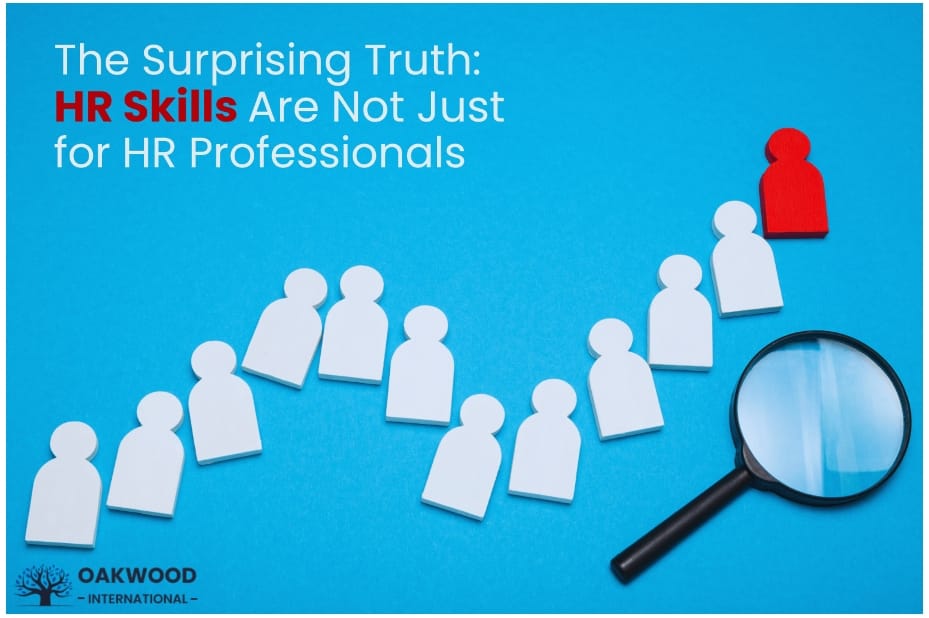No products in the cart.
The Surprising Truth: HR Skills Are Not Just for HR Professionals
Have you ever noticed how some managers easily connect with their teams? It’s not magic; it’s their understanding of the skills needed to manage people effectively. In today’s workplaces, managing people isn’t just the responsibility of HR. Managers of all kinds need to hire, motivate, and support their teams. The surprising truth is, HR Skills for Non-HR Managers are key to being a great leader. Let’s find out how HR Skills can make a big difference in any organisation.

Table of Contents
- Why Non-HR Managers Need HR Skills to Lead Effectively
- HR Skills That Every Manager Should Know
- Conclusion
Why Non-HR Managers Need HR Skills to Lead Effectively
Non-HR managers often work closely with their teams, managing daily operations and performance. Nevertheless, individuals face difficulties in duties like dispute resolution or performance evaluations without fundamental HR skills. HR knowledge helps managers:
- Hire Right: Understanding recruitment techniques ensures the best fit for the team.
- Effectively Motivate: Recognising and rewarding achievement enhances morale.
- Conflict Management: Proficient in conflict resolution strategies, managers can preserve peace.
- Ensure Compliance: Knowing the rules about work lowers the risk of legal trouble.
With these skills, managers can create a good work setting that makes employees happier and more productive.
HR Skills That Every Manager Should Know
Although HR specialists thoroughly explore several facets of workforce management, managers must comprehend some fundamental HR abilities. These comprise:
Recruitment and Selection
Hiring the right talent can make or break a team. Managers with robust HR competencies formulate persuasive job descriptions, execute efficient interviews, and choose applicants that resonate with the organisation’s values. Furthermore, comprehending contemporary recruiting platforms and using data-driven hiring methodologies might enhance efficiency and results. It also involves learning to craft engaging job advertisements, collaborating effectively with HR teams, and assessing candidates for skills and cultural fit.
Performance Management
Setting clear goals, providing constructive feedback, and conducting performance appraisals are crucial. These skills assist managers in cultivating talent and promoting continuous improvement. Establishing frequent check-ins and using performance indicators to monitor growth and progress over time is essential. Effective performance management requires the ability to provide feedback that inspires rather than discourages, as well as acknowledging individual efforts to enhance morale.
Employee Engagement
Engaged employees are more productive and loyal. Managers proficient in engagement tactics cultivate stronger, more cohesive teams. Recognising successes, fostering open communication, and facilitating chances for professional development enhance engagement. Using surveys to measure employee satisfaction, organising team-building activities, and creating an environment of trust and transparency are essential for maintaining engagement.
Conflict Resolution
Disagreements are unavoidable in any workplace. Managers with conflict resolution abilities may promptly handle concerns and maintain a pleasant environment. They should also acquire excellent mediation skills, fostering empathy and comprehension to settle conflicts constructively. Understanding prevalent reasons for conflict, such as communication failures, and using tactics like active listening and collaborative problem-solving enable dispute resolution.
Training and Development
Investing in employee growth is essential for long-term success. Managers must detect skill gaps, provide proper training, and promote continuing education to maintain team adaptability and motivation. This encompasses the formulation of individualised development plans, promoting engagement in external courses and seminars, and using online learning platforms for continuous skill advancement. Consistent training initiatives help employees stay updated with industry trends and innovations.
Workplace Culture Building
An affirmative and inclusive organisational culture improves morale and production. Managers must comprehend how to cultivate a culture of respect, teamwork, and shared ideals inside their teams. Establishing a robust culture requires exemplifying leadership, acknowledging team accomplishments, and confronting actions that contradict organisational ideals. Managers must prioritise diversity and inclusion, guaranteeing that all individuals feel esteemed and appreciated.
A positive and inclusive workplace culture enhances morale and productivity. Managers must comprehend how to cultivate a culture of respect, teamwork, and shared ideals inside their teams.
Conclusion
The reality is clear: HR Skills for Non-HR Managers are indispensable for effective leadership. Managers who invest time in understanding HR principles are better equipped to handle people-related challenges and contribute to their organisation’s growth.
If you want to enhance your HR knowledge or help your team leaders build these essential skills, Oakwood International offers insightful courses to make HR concepts accessible and practical for managers across industries.












